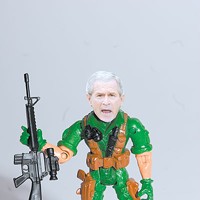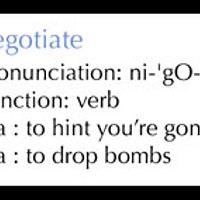Because he tends not to display his panty-less cha-cha in the presence of paparazzi, chances are you've never heard of Flynt Leverett. Let me tell you a few important things about him:
1. He has perhaps the most awesomely masculine name ever. The only names I can think of that are more awesomely masculine are Rod O'Hardsteele and Awesomo McKickyerass. Since I made them up, however, they don't count.
2. Leverett graduated from Texas Christian University in 1978. TCU's mascot is the horned frog. According to TCU's Web site, "When angered or frightened, horned frogs can squirt a fine, four-foot stream of blood from their eyes."
3. Leverett has worked in government under two Bushes and one Clinton. From February 2002 to March 2003, he worked for the current president as senior director for Middle East Affairs on the National Security Council. March 2003 was when the United States invaded Iraq. Leverett quit the Bush administration because he didn't want to be a part of an administration that was screwing up foreign policy so spectacularly. Leverett put it more politely on the radio program "Democracy Now!" in April 2004: "I disagreed with so many -- so many aspects of their whole strategy for approaching this region [the Middle East] and for dealing with the war on terror."
4. Perhaps the most important thing you need to know about Flynt Leverett is that he recently wrote two devastating critiques of the Bush administration's thoroughly counterproductive Iran strategy.
On Dec. 4, public-policy think tank the Century Foundation published his 30-page report, titled "Dealing With Tehran: Assessing U.S. Diplomatic Options Toward Iran." In the report, Leverett methodically points out how the Bush administration policy has significantly increased Iran's power in the region, strengthened Iran's most stridently anti-American leaders and accelerated the nuclear weapons development that we're supposedly trying to stop.
The most painful part of the report to read is a review of how the Bush administration started off dealing with Iran from a position of relative power before squandering that power through carelessness and stupidity.
From the weeks following 9/11 through 2003, Iran's government was so scared of ending up on the wrong side of the War On Terror® that it cooperated with the United States in Afghanistan. Even after Bush called Iran a member of the "Axis of Evil" in January 2002, Iran's government continued to reach out to the United States with regular diplomatic meetings.
In spring 2003, Iran even proposed bilateral talks aimed at resolving all of the major disputes between the United States and Iran, including nuclear weapons. The proposal arrived shortly after the United States toppled Saddam -- in other words, it arrived at the peak of U.S. military and diplomatic leverage in the Middle East. The Bush administration rebuffed Iran's offer.
What's happened since then? Iran's top theocrats purged the government of moderates who wanted to engage the United States. In 2005, that led to the presidency of Mahmoud Ahmadinejad. And the United States has gotten bogged down and beaten up in an Iraqi civil war. We still want Iran to give up its nuclear program, but we now have less power to force them to negotiate.
Leverett's second critique of the Bush administration's Iran strategy was a 1,000-word op-ed commissioned by the New York Times.
Based largely on his 30-pager, it was supposed to appear in the Times in early December, but did not.
According to Leverett, the White House forced the CIA Publications Review Board to block his essay on the grounds that it revealed classified info. Leverett says that everything he wrote in the essay has been publicly written or spoken about already. It's hard not to believe him. After all, the same board had just OK'd Leverett's 30-page report without changing a word.
Is the White House simply crying "national security" to protect itself from criticism in a wide-circulation publication? I don't know. Is this columnist asking a leading, loaded question to insinuate that this White House is illegally suppressing criticism? I don't know.
Leverett's CIA-edited piece appeared in the New York Times on Dec. 22. The online version includes links to public sources that discuss all of the bits the White House and CIA crossed out.
Flynt Leverett's report, "Dealing With Tehran: Assessing U.S. Diplomatic Options Toward Iran," is available here.
Speaking of 5.00000
-
A Family Affair
Dec 12, 2007 -

Darrell Roach
Dec 12, 2007 -
Body Talk
Dec 12, 2007 - More »
Latest in Don't Panic
More by Andisheh Nouraee
-
Remember me?
Oct 17, 2007 -

Notable news events since 2001
Oct 17, 2007 -

The War on Terror™, so far
Oct 17, 2007 - More »
Calendar
-

Wine & Paint @ Blackfinn Ameripub- Ballantyne
-

Face to Face Foundation Gala @ The Revelry North End
-
An Evening With Phil Rosenthal Of "Somebody Feed Phil" @ Knight Theater
-
Kountry Wayne: The King Of Hearts Tour @ Ovens Auditorium
-

Queen Charlotte Fair @ Route 29 Pavilion
-
Canuck in the Queen City 7
A Canadian transplant looks back at her first year as a Charlotte resident
-
Homer's night on the town 41
If you drank a shot with the Knights mascot on Sept. 20, you were basically harboring a fugitive
-
Delic Holdings Inc. Announces Meet DELIC, the Premiere Psychedelic and Wellness Edutainment Event and Expo for Newcomers and Veteran Psychonauts, Announces Initial Speaker Lineup 42











